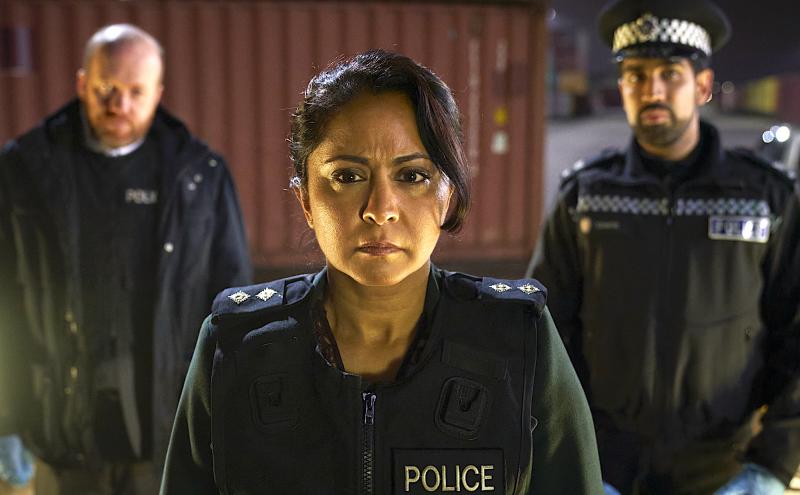DI Ray, ITV review - Parminder Nagra battles killer gangs and cultural stereotypes | reviews, news & interviews
DI Ray, ITV review - Parminder Nagra battles killer gangs and cultural stereotypes
DI Ray, ITV review - Parminder Nagra battles killer gangs and cultural stereotypes
Cops afflicted by sexism, racism and box-ticking mediocrity

Somehow or other, fictional representations of the police have become an off-the-cuff index of changing times and evolving values. Dixon of Dock Green’s cops were stern father figures who knew right from wrong and considered it their duty to give villains a clip round the ear.
With all that ladled onto its plate, DI Ray’s first couple of episodes (out of four) struggled to build up momentum. It was a bit like being made to stand to attention while various officers recited verbatim extracts from the Police Regulations. Strings of acronyms and operational formulae called to mind the jargon-labyrinths of Line of Duty, so perhaps it’s no coincidence that DI Ray’s writer Maya Sondhi played PC Maneet Bindra in Line of Duty, while LoD creator Jed Mercurio is one of DI Ray’s producers.
 But while the Birmingham-set DI Ray turns out to be a not entirely unfamiliar story about organised crime and police corruption, it also seeks to shine a light into the problems of a multi-cultural Midlands police force trying to get to grips with crimes involving multi-racial perps and victims. Lighting the fuse on the action is the murder of Imran Aziz, which prompts a fast-track promotion for DI Rachita Ray (Parminder Nagra) to head a team to investigate this “Culturally Specific Homicide”. Ray has been keen to be given a chance as a homicide detective, but her joy is diminished as she becomes aware that she’s been given the promotion to improve the racially-inclusive “optics”, not because Superintendent Beardsmore (Ian Puleston-Davies) thinks she’s any good at her job.
But while the Birmingham-set DI Ray turns out to be a not entirely unfamiliar story about organised crime and police corruption, it also seeks to shine a light into the problems of a multi-cultural Midlands police force trying to get to grips with crimes involving multi-racial perps and victims. Lighting the fuse on the action is the murder of Imran Aziz, which prompts a fast-track promotion for DI Rachita Ray (Parminder Nagra) to head a team to investigate this “Culturally Specific Homicide”. Ray has been keen to be given a chance as a homicide detective, but her joy is diminished as she becomes aware that she’s been given the promotion to improve the racially-inclusive “optics”, not because Superintendent Beardsmore (Ian Puleston-Davies) thinks she’s any good at her job.
The death of Aziz’s girfriend Anjuli follows in short order after she tries to give vital clues to Ray, and the police automatically reach the stereotyped conclusion that they’re looking at honour killings by two Asian brothers, but Sondhi’s story is more nuanced than that. Ray herself is caught in a cultural no-person’s-land, being the daughter of Anglicised Indian parents and who doesn’t speak the languages of the subcontinent. As she points out, “I’m not Indian enough for the Indians and I’m not white.” Racist attitudes are latent rather than overt, expressed through small incidents such as a white PC giving Ray the identity pass for a different Asian officer, or when she goes shopping and is mistaken for the shop assistant. Scenes where she and her (white) fiance, DCI Martyn Hunter (a sleazy Jamie Bamber, pictured above with Nagra), meet their respective parents are about as relaxing as having your toenails pulled out.
With Sondhi striving to touch all these bases, the show only belatedly hits its stride as a fairly decent thriller about drug and people smuggling on a massive scale, with a side-order of Bent Copper for extra flavouring. Nagra’s titular character naturally proves far tougher and more resourceful than she’s given credit for by superior officers like DCI Henderson (a begrudging, sour-faced Gemma Whelan), though she and the viewer desperately need some alternatives to her fixed expression of glum-faced doggedness. A second series might give DI Ray space to breathe and develop.
rating
Explore topics
Share this article
The future of Arts Journalism
You can stop theartsdesk.com closing!
We urgently need financing to survive. Our fundraising drive has thus far raised £49,000 but we need to reach £100,000 or we will be forced to close. Please contribute here: https://gofund.me/c3f6033d
And if you can forward this information to anyone who might assist, we’d be grateful.

Subscribe to theartsdesk.com
Thank you for continuing to read our work on theartsdesk.com. For unlimited access to every article in its entirety, including our archive of more than 15,000 pieces, we're asking for £5 per month or £40 per year. We feel it's a very good deal, and hope you do too.
To take a subscription now simply click here.
And if you're looking for that extra gift for a friend or family member, why not treat them to a theartsdesk.com gift subscription?
more TV
 Down Cemetery Road, Apple TV review - wit, grit and a twisty plot, plus Emma Thompson on top form
Mick Herron's female private investigator gets a stellar adaptation
Down Cemetery Road, Apple TV review - wit, grit and a twisty plot, plus Emma Thompson on top form
Mick Herron's female private investigator gets a stellar adaptation
 theartsdesk Q&A: director Stefano Sollima on the relevance of true crime story 'The Monster of Florence'
The director of hit TV series 'Gomorrah' examines another dark dimension of Italian culture
theartsdesk Q&A: director Stefano Sollima on the relevance of true crime story 'The Monster of Florence'
The director of hit TV series 'Gomorrah' examines another dark dimension of Italian culture
 The Monster of Florence, Netflix review - dramatisation of notorious Italian serial killer mystery
Director Stefano Sollima's four-parter makes gruelling viewing
The Monster of Florence, Netflix review - dramatisation of notorious Italian serial killer mystery
Director Stefano Sollima's four-parter makes gruelling viewing
 The Diplomat, Season 3, Netflix review - Ambassador Kate Wyler becomes America's Second Lady
Soapy transatlantic political drama keeps the Special Relationship alive
The Diplomat, Season 3, Netflix review - Ambassador Kate Wyler becomes America's Second Lady
Soapy transatlantic political drama keeps the Special Relationship alive
 The Perfect Neighbor, Netflix review - Florida found-footage documentary is a harrowing watch
Sundance winner chronicles a death that should have been prevented
The Perfect Neighbor, Netflix review - Florida found-footage documentary is a harrowing watch
Sundance winner chronicles a death that should have been prevented
 Murder Before Evensong, Acorn TV review - death comes to the picturesque village of Champton
The Rev Richard Coles's sleuthing cleric hits the screen
Murder Before Evensong, Acorn TV review - death comes to the picturesque village of Champton
The Rev Richard Coles's sleuthing cleric hits the screen
 Black Rabbit, Netflix review - grime and punishment in New York City
Jude Law and Jason Bateman tread the thin line between love and hate
Black Rabbit, Netflix review - grime and punishment in New York City
Jude Law and Jason Bateman tread the thin line between love and hate
 The Hack, ITV review - plodding anatomy of twin UK scandals
Jack Thorne's skill can't disguise the bagginess of his double-headed material
The Hack, ITV review - plodding anatomy of twin UK scandals
Jack Thorne's skill can't disguise the bagginess of his double-headed material
 Slow Horses, Series 5, Apple TV+ review - terror, trauma and impeccable comic timing
Jackson Lamb's band of MI5 misfits continues to fascinate and amuse
Slow Horses, Series 5, Apple TV+ review - terror, trauma and impeccable comic timing
Jackson Lamb's band of MI5 misfits continues to fascinate and amuse
 Coldwater, ITV1 review - horror and black comedy in the Highlands
Superb cast lights up David Ireland's cunning thriller
Coldwater, ITV1 review - horror and black comedy in the Highlands
Superb cast lights up David Ireland's cunning thriller
 Blu-ray: The Sweeney - Series One
Influential and entertaining 1970s police drama, handsomely restored
Blu-ray: The Sweeney - Series One
Influential and entertaining 1970s police drama, handsomely restored
 I Fought the Law, ITVX review - how an 800-year-old law was challenged and changed
Sheridan Smith's raw performance dominates ITV's new docudrama about injustice
I Fought the Law, ITVX review - how an 800-year-old law was challenged and changed
Sheridan Smith's raw performance dominates ITV's new docudrama about injustice

Add comment